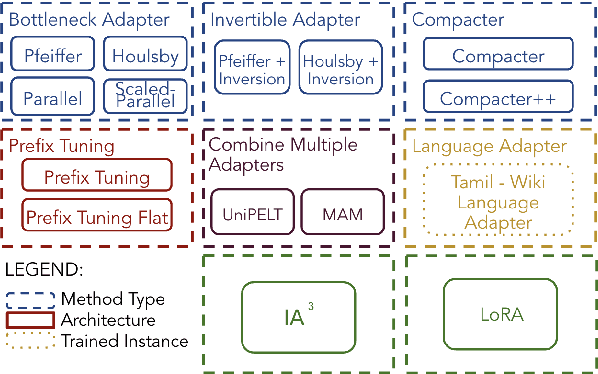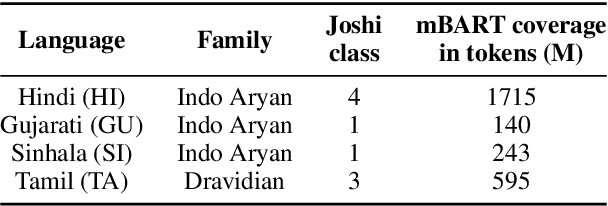David Guzmán
MERLIN: Multi-Stage Curriculum Alignment for Multilingual Encoder and LLM Fusion
Sep 09, 2025Abstract:Large language models excel in English but still struggle with complex reasoning in many low-resource languages (LRLs). Existing encoder-plus-decoder methods such as LangBridge and MindMerger raise accuracy on mid and high-resource languages, yet they leave a large gap on LRLs. We present MERLIN, a two-stage model-stacking framework that applies a curriculum learning strategy -- from general bilingual bitext to task-specific data -- and adapts only a small set of DoRA weights. On the AfriMGSM benchmark MERLIN improves exact-match accuracy by +12.9 pp over MindMerger and outperforms GPT-4o-mini. It also yields consistent gains on MGSM and MSVAMP (+0.9 and +2.8 pp), demonstrating effectiveness across both low and high-resource settings.
AlignFreeze: Navigating the Impact of Realignment on the Layers of Multilingual Models Across Diverse Languages
Feb 18, 2025Abstract:Realignment techniques are often employed to enhance cross-lingual transfer in multilingual language models, still, they can sometimes degrade performance in languages that differ significantly from the fine-tuned source language. This paper introduces AlignFreeze, a method that freezes either the layers' lower half or upper half during realignment. Through controlled experiments on 4 tasks, 3 models, and in 35 languages, we find that realignment affects all the layers but can be the most detrimental to the lower ones. Freezing the lower layers can prevent performance degradation. Particularly, AlignFreeze improves Part-of-Speech (PoS) tagging performances in languages where full realignment fails: with XLM-R, it provides improvements of more than one standard deviation in accuracy in seven more languages than full realignment.
Unlocking Parameter-Efficient Fine-Tuning for Low-Resource Language Translation
Apr 05, 2024



Abstract:Parameter-efficient fine-tuning (PEFT) methods are increasingly vital in adapting large-scale pre-trained language models for diverse tasks, offering a balance between adaptability and computational efficiency. They are important in Low-Resource Language (LRL) Neural Machine Translation (NMT) to enhance translation accuracy with minimal resources. However, their practical effectiveness varies significantly across different languages. We conducted comprehensive empirical experiments with varying LRL domains and sizes to evaluate the performance of 8 PEFT methods with in total of 15 architectures using the SacreBLEU score. We showed that 6 PEFT architectures outperform the baseline for both in-domain and out-domain tests and the Houlsby+Inversion adapter has the best performance overall, proving the effectiveness of PEFT methods.
 Add to Chrome
Add to Chrome Add to Firefox
Add to Firefox Add to Edge
Add to Edge